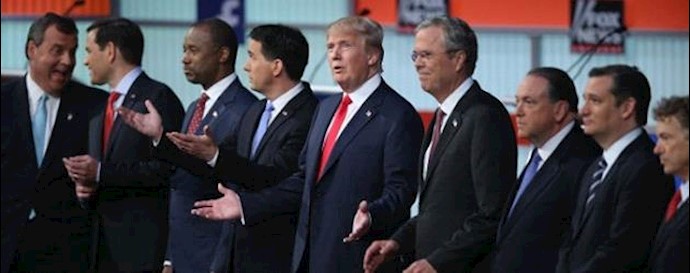The GOP presidential debates will have one major topic in the framework of foreign policy where all Republicans agree that the Iran nuclear deal is flawed, The Wall Street Journal reported.
As soon as New Jersey Gov. Chris Christie’s black SUV pulled up to a backyard barbecue here in New Hampshire the other day, the presidential candidate exited, took a microphone and, in classic Christie style, dispensed with any warm-up to dive straight into his argument.
President Barack Obama, Mr. Christie declared, has “shoved down the throats of the American people the worst foreign-policy mistake I’ve ever seen” in the new nuclear deal with Iran. “Iran is going to be emboldened,” he said. “The big lie of the first term of the Obama administration was if you like your doctor you can keep him, and if you like your health plan you can keep it. The big lie of the second Obama term is the Iran deal, where the president says we’ll have anytime, anywhere inspections….”
Thus has the messy, bitter and ultimately unsatisfying Washington debate over the Iran nuclear deal moved smack into the middle of the 2016 presidential race.
The issue’s new prominence figures to be on display on national television Wednesday night at the second Republican presidential debate. The debate is being co-moderated by conservative radio talk show host Hugh Hewitt, who has shown an eagerness to bore in on foreign-policy topics with GOP contenders.
The Iran deal also is pushing up the profile of national-security issues more broadly in the 2016 conversation.
A series of campaign events in New Hampshire, home of the nation’s first primary, showed that
voters are more inclined to talk about the threat from Islamic extremism. When Sen. Marco Rubio spoke at a country store in Hooksett last week, for example, he opened by delivering his standard campaign presentation, then took questions. The first was on the threat from Islamic State; two of the four he received were on foreign policy.
The questions convey anxiety, a bit of fear, and an unmistakable level of confusion about a set of threats that simply don’t match up with previous experiences. “People sense the world is chaotic, and they want someone to make sense of it for them and show them a path forward,” Mr. Rubio said in an interview afterward.
The rising prominence of national-security questions also raises one unavoidable question: Does this trend help or hurt Donald Trump, the now-undisputed GOP front-runner? He charges past foreign-policy questions with characteristic hubris, ignoring the details and saying he’ll negotiate great deals with friend and foe alike and hire the best people to advise him on the rest. But he also failed a kind of foreign-policy pop quiz on Mr. Hewitt’s talk show not long ago, and it isn’t clear that brash and pugilistic will work so well if voters end up seeking calm and reassuring in an unsettled world.
Certainly some of the other candidates on the debate stage this week have done more to prepare their national-security resumes. Former Florida Gov. Jeb Bush can break into fluent Spanish at any point. Mr. Rubio can as well, and he also has methodically used his Senate base on both the Foreign Relations and Intelligence Committees, as well as a set of foreign trips, to ramp up on security matters.
Ohio Gov. John Kasich harks back to long years spent on defense issues during his years in Congress, and now is going out of his way to speak on security matters and his world travels on the campaign trail, seeing that as an area of relative strength.
For all the Republican contenders, the easy part of the conversation right now is opposing the Iran nuclear deal. All of them do, even Sen. Rand Paul, the noninterventionist in the field who actually supported diplomacy with Iran when it started.
But there are variations on the theme. Mr. Rubio told his audience in Hooksett that he would “end whatever deal is in place with Iran” on his first day as president. Later, in the interview, he said he would reimpose the current economic sanctions on Iran by executive order, ask Congress to impose new ones and then back them with a “credible” threat of military action.
Others haven’t been quite that brash. Mr. Bush says he’d at least want to talk to his advisers about how to proceed before ditching the deal. Similarly, Mr. Kasich says that he’d want to explore how the U.S. might exit the agreement, and that Iranian cheating, undisclosed elements in side deals on inspections or Iranian support of extremists all might provide a pretext.
But in an interview he hastens to add: “I shouldn’t be misunderstood on that. First of all, I think the deal is terrible. I think it’s a big mistake.”
2016 US Presidential Debate Sees Iran Nuclear Deal Land in the Middle
RELATED ARTICLES








